Best alternatives to Google Maps that focus on privacy
Did you know that navigation apps don’t actually need to track your location or store your data to work? Google Maps is notorious for finding ways to secretly track your every move, but it doesn’t have to be that way. There are map apps out there that care about your privacy.
Contents
Why you can’t trust Google Maps
In 2018, Google was caught red-handed. They had told their users that they have full control of their location history and can ‘edit, delete or turn it off at any time.’ But Google forgot to mention that they still use other means to track users’ locations.
Turning off your location data only stops Google from creating a timeline of where you’ve been throughout the day. However, if you don’t turn off another feature called Web & App activity, which is hidden in your settings, your location can still be tracked.
Every time you open Google Maps, search for something via Google Search, or just use any other Google app, they will send timestamps back to Google and will create an accurate image of where you’ve been. You can find and manually delete these records by going to the My Activity page. (Click on ‘Delete activity by’ and choose ‘All time’ from the drop down menu.)
This data is then combined with your existing user profile and used to serve you targeted ads. This type of data is extremely valuable to to Google, so it’s no surprise that they kept a few secrets to keep doing what they do best.
The best Google Maps alternatives
The good news are that there are navigation apps that can be used offline and don’t track your location. However, that means that their functionality will be limited and the directions might not be as accurate. You may still have to sacrifice some form of data in order to use their services. Most of them will request some or all of the following information:
- Personal data you used to create your account. This may be required by law or will be used to confirm your identity if you ever need to speak to customer support;
- Your device model and IP address, which will be used for app development purposes;
- Your primary location (either entered manually or taken from your IP address) – to show you search results in the country you are currently in and match the language;
- Data collected through cookies to be used for marketing analysis;
- Behavioral data like your favorite places so they can provide you with targeted ads.
It’s almost impossible to use a navigation app that wouldn’t require some data. Though it’s up to you to choose an app that is trustworthy and transparent about data collection. There are apps out there that give you the freedom to minimize data collection rather collecting it behind your back. Chck out some of the best Google Maps alternatives, some of which care much more about your privacy.
Waze
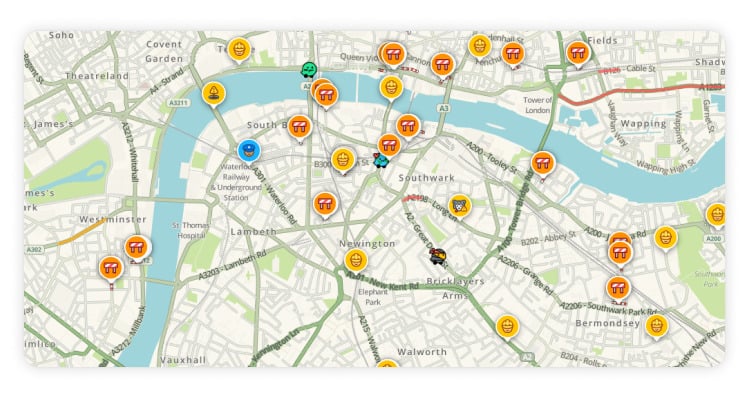
- Crowd-sourced data
- Features social functions like route sharing and carpooling
- Provides real-time traffic data
- Owned by Google
- Has had vulnerabilities in the past
Waze is a popular map app with all sorts of extra featurs that have made it a very popular Google Maps alternative. Many users have especially enjoyed the speed camera report function.
Unfortunately, we cannot recommend Waze. One of the most significant issues is that Waze is owned by Google. The privacy policy grants Google the right to do nearly anything with users’ data, meaning it isn’t really a Google Maps alternative at all from a privacy standpoint. Cybersecurity researchers have also documented cases where Waze user data, including location data, has been potentially vulnerable to hackers as well.
Apple Maps

- Beautiful design
- Has most features that users will expect from other leading map apps like Google Maps
- Good privacy-centric design and reputation
- Exclusive to Apple devices
Apple has an excellent reputation for quality design and robust features, and the Apple Maps app is no different. In addition to the basic features you’d expect from a top-tier map app, like traffic data and points of interest, it also is integrated fully with Apple’s Siri voice feature. One big drawback, which is common to many Apple products, is that it is exclusive to the Apple environment.
In addition to their excellent design, Apple also has a good reputation for respecting data privacy (although they aren’t perfect). Settings are synced across the user’s devices using end-to-end encryption and Apple claims not to collect any data that isn’t directly submitted by the user when using certain features.
MapQuest
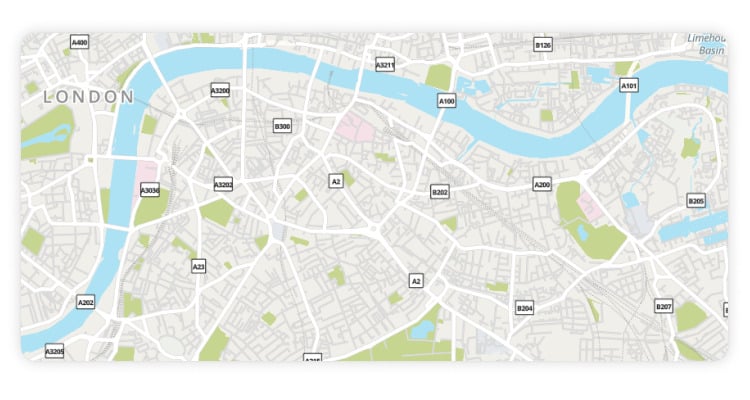
- Long-standing mapping product
- Offers unique features that differentiate it from Google Maps
- Lacking information on privacy practices and reputation
- Criticized by some as a dead or dying map app
MaqQuest has been around about as long as Google Maps has, but they’ve experienced far less success – perhaps because they don’t have the powerful inter-service features that Google can offer. Most users report that MapQuest also has weaker pathfinding capabilities than Google Maps when it comes to directions, but it does offer interesting features that some users may appreciate, like one-click navigation to nearby points of interest, gas price estimate for your route, and local temperature readouts.
From a privacy standpoint, the information on MapQuest’s privacy practices is scant. MapQuest does make money by offering special features to businesses, so there’s room to assume that data may not be the apps’ primary business model. Therefore, it is unclear if MapQuest makes for a good Google Maps alternative.
HERE WeGo
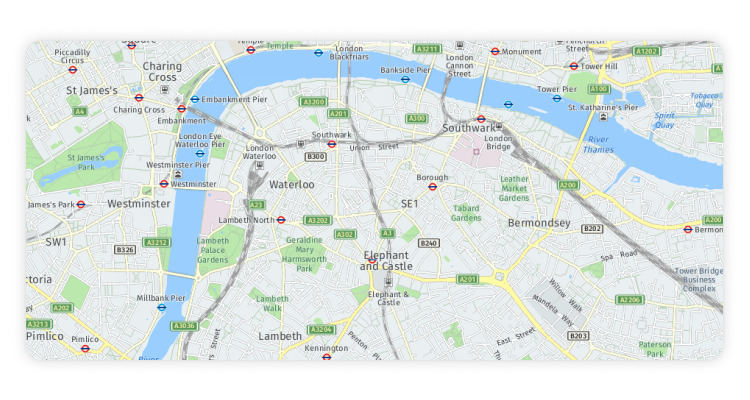
- A vast database of points of interests
- Has offline maps for 200 countries that you can download on your device
- Provides real-time traffic data
- Timestamps used for navigation are deleted when you finish your session
- Complies with GDPR rules and regulations
- Not as up-to-date as Google Maps
This navigation app developed by Nokia and now owned by well-known car manufacturers – Audi, BMW, and Daimler – has many great features that Google Maps lacks. What distinguishes it from the rest is its ‘Places’ option, a huge database of points of interests including restaurants, theme parks, gas stations, ATMs, pharmacies, and hotels.
HERE WeGo falls under GDPR rules and regulations, so you can be sure that your data is in good hands. It’s also good to know that your places, GPS location, and the timestamps used to provide you directions are never associated with your account and are deleted the moment your session is over. Similarly to Google, it uses behavioral advertising, but you can easily change these settings so the ads you see won’t profile you.
Maps.Me

- Designed to work offline and provide results in 345 countries
- Allows you to share hiking trails and your location with your friends
- Points of interests are categorized and easy to browse
- Open-source platform
- Uses OpenStreetMap database
- Complies with GDPR rules and regulations (EU customers only)
- Provides location-based ads
Maps.Me is a good option for those who need an offline maps service with many points of interests. This app is automatically stored offline and provides you with search results and directions in 345 countries and islands. It’s also one of the few maps that show hiking trails. You can bookmark and share your location with friends, too. The online version provides traffic information, public transport, and cycling navigation. Maps.Me is an open source platform with data from OpenStreetMap, which means that anyone can search it for vulnerabilities and help make it more secure.
Unfortunately, Maps.Me does use your location data to provide you with targeted ads and points of interests. On the other hand, that’s the only data they use to provide you ads, and third parties are not given any personally identifiable information. The app also has privacy regulations for EU and non-EU users, the former complying with GDPR rules. If you reside in the EU, this means that you can ask app providers to show you what information they have about you and ask them to delete that information.
OsmAnd
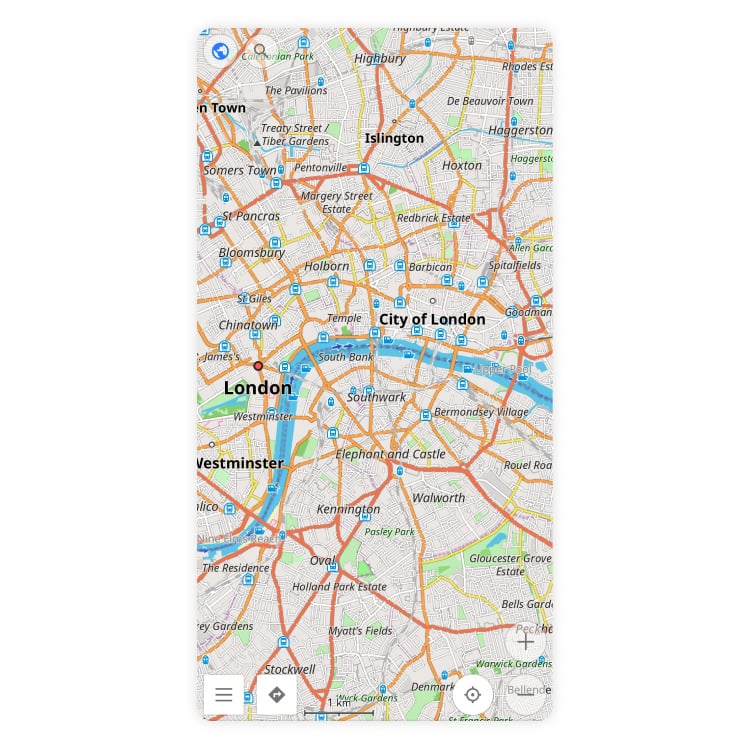
- Uses OpenStreetMaps map data
- Strong privacy practices and a profit model that avoids data sharing
- Excellent and unique features including an offline mode
- Complies with GDPR rules and regulations
- Users sometimes report poor performance and long loadtimes for free version of app
OsmAnd is one of the leading privacy-oriented Google Maps alternatives. Not only that, they also offer excellent additional features that users might appreciate. A big one for users who want to save on data costs or travel in remote locations is offline map loading – you can download map data for certain locations to your phone so you don’t need to use data to navigate. Pathfinding can sometimes even improve on that of Google Maps because OsmAnd uses OpenStreetMaps, which is user-updated.
OsmAnd claims to support user privacy and they operate a freemium model, meaning that they ask users to pay for a more feature-rich premium version. This means they don’t have to rely on selling user data to stay afloat, which is great news.
CityMapper
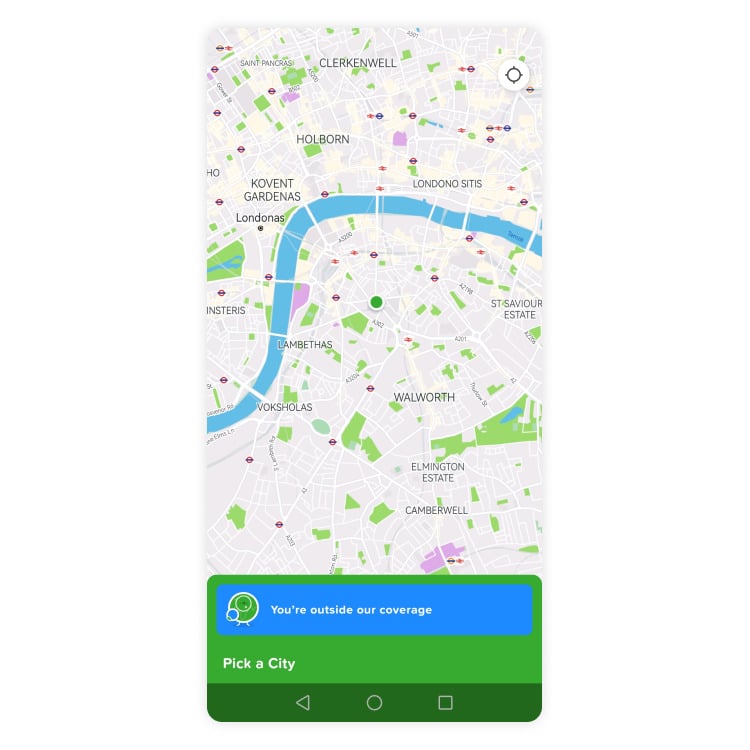
- Specialized tool for city transportation planning
- Collects data from city governments to maintain updated info
- Integrates third-party transportation services for ease of use
- Specialized features limit use cases outside of supported cities
- Not all cities are supported
- Shares data, including location data, with numerous third parties
CityMapper is a specialized app that offers public transportation data to users. Enter two locations in your city and it’ll offer a number of different ways to get their using various modes of city transportation. This makes its use cases more specific than most of the apps on this list, but it does excel at what it does.
Unfortunately, CityMapper is not a viable Google Maps alternative from a privacy standpoint. They share your data with certain ride providers and city services to enable in-app ride planning, which is to be expected. However, they also share partially de-personalized data, including your location, with Google and other search services. As such, this app is no improvement from a privacy standpoint.
OpenStreetMap
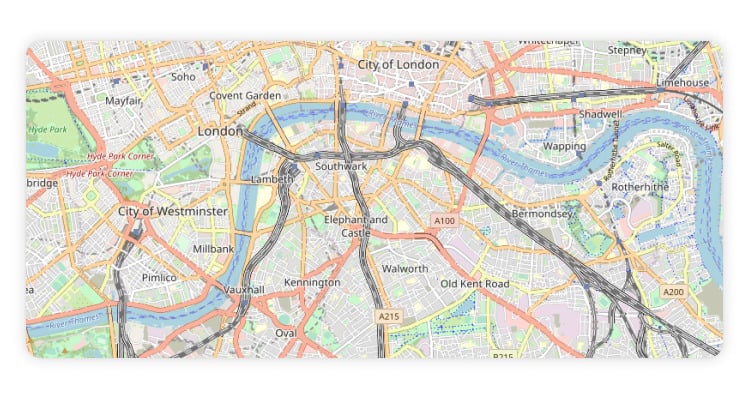
- Doesn’t have behavioral ads
- Map information is provided by worldwide volunteer network
- Simple and easy to use
- Has an offline mode
- Complies with GDPR rules and regulations
- Doesn’t accept anonymous contributions to the map
OpenStreetMap is a non-profit navigation platform that was inspired by Wikipedia. The app uses an “open data” concept, meaning that volunteers can edit the maps all over the world and that all of the data is collected from ground surveys, GPS units, and cameras used by those contributors. If you’ve noticed that the map is missing something, you can simply add it yourself and leave a note for other users.
It doesn’t offer any fancy features, but it’s great if you are looking for an easy-to-use app that can provide you with quick directions for driving, cycling, and walking. It will also help you if you are looking for a specific building as you can simply click on it and see its address.
The app works with a couple of third parties that help them run the service and update the app. Fortunately, they all fall under the EU’s jurisdiction and comply with GDPR rules. Your personal data will never be shared with any of them and can only be seen by system administrators. IP addresses and other data is deleted after 180 days.
Sygic Maps
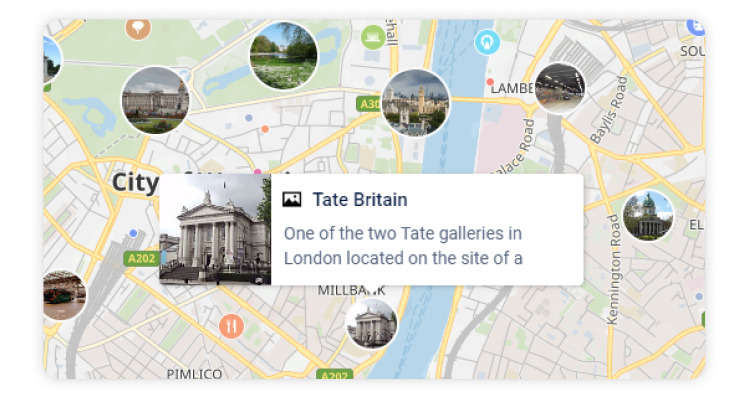
- Offers recommendations provided by TripAdvisor
- Provides location-tailored Travel Guides
- Has advanced navigation features like parking spot suggestions
- Complies with GDPR rules and regulations
- Has strict timelines for data storage
Sygic Maps is another great app that is free to use and offers everything you might need – information on traffic conditions, points of interests, and an offline mode. If you use Sygic for navigation, it will show you parking spot suggestions, lane guidance, speed limit warnings, and road closures. You can even use GPS navigation offline. However, beware that some of these features might only be available to Premium users.
Sygic also has strict rules when it comes to data storage. They delete your data as soon as you remove the app with other deadlines being:
- Data used for application improvement is deleted after 3 months.
- Security and system logs are deleted after 1 year.
- Back-ups for security purposes are deleted after 3 years.
Conclusion
Given its popularity, Google Maps is an easy and understandable first choice for most users. But with just a little bit of searching, there is a whole world of private mapping apps out there. Not only will these Google Maps alternatives keep you more private and secure, but it is also likely that one of them might have features that you never knew you needed. Give one of them a try and see if they’re right for you.
Want to read more like this?
Get the latest news and tips from NordVPN.